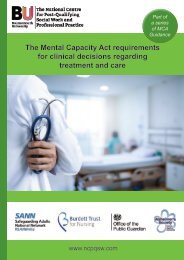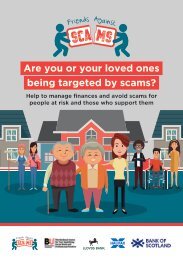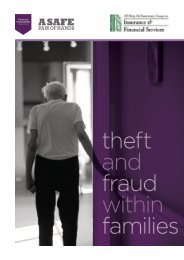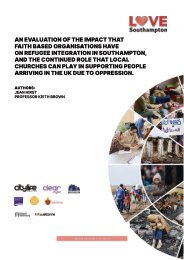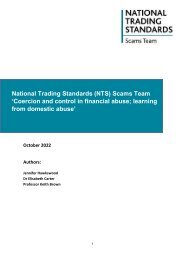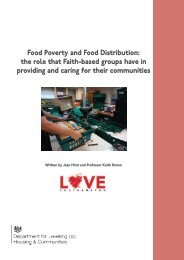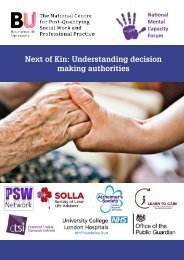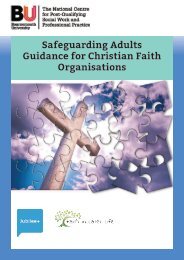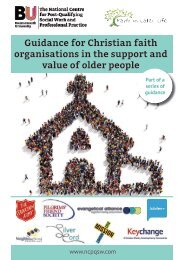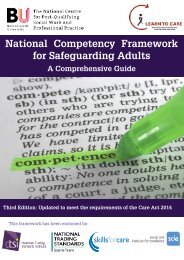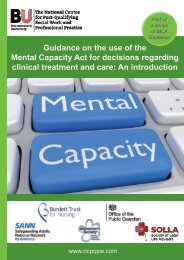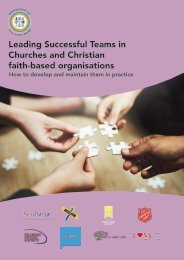Loneliness in Older People - Online
Some of the isolation and loneliness which people in the Fourth Age experience is due to the ageism in our society and in our churches. It is now time for churches to stand-up to the prejudices and discrimination of older people, to challenge the ageism we see in society and show that people in the Fourth Age are valued, celebrated, respected and included. Churches and Christian faith organisations should be leading the way to reach out to older people, to tackle ageist views and attitudes and demonstrate that older people matter.
Some of the isolation and loneliness which people in the Fourth Age experience is due to the ageism in our society and in our churches. It is now time for churches to stand-up to the
prejudices and discrimination of older people, to challenge the ageism we see in society and show that people in the Fourth Age are valued, celebrated, respected and included. Churches
and Christian faith organisations should be leading the way to reach out to older people, to tackle ageist views and attitudes and demonstrate that older people matter.
You also want an ePaper? Increase the reach of your titles
YUMPU automatically turns print PDFs into web optimized ePapers that Google loves.
Demographics lead<strong>in</strong>g to an isolated generation<br />
The demographic changes over the last few decades, lead<strong>in</strong>g to our age<strong>in</strong>g population, have<br />
resulted <strong>in</strong> <strong>in</strong>creas<strong>in</strong>g numbers and a larger proportion of older people, many of whom will live<br />
on their own (Office of National Statistics 2018). It is estimated that 3.6 million older people are<br />
currently liv<strong>in</strong>g alone <strong>in</strong> the UK, many struggl<strong>in</strong>g with health issues, reduced social activities,<br />
bereavement and loss. With a third of older people liv<strong>in</strong>g alone report<strong>in</strong>g that they can go<br />
without speak<strong>in</strong>g to a family member or friend for a month, there are many people who are<br />
feel<strong>in</strong>g isolated and lonely (Age UK 2018).<br />
Factors lead<strong>in</strong>g to lonel<strong>in</strong>ess are well identified:<br />
• Reduced health status – mak<strong>in</strong>g it difficult for people to get out and about<br />
• Disability and reduced functional ability – particularly those with reduced mobility,<br />
<strong>in</strong>cont<strong>in</strong>ence, cognitive impairment<br />
• Be<strong>in</strong>g widowed – and recently bereaved<br />
• Liv<strong>in</strong>g alone – which can be isolat<strong>in</strong>g and reduce social contacts<br />
• Liv<strong>in</strong>g <strong>in</strong> poor or isolat<strong>in</strong>g hous<strong>in</strong>g<br />
(Age UK 2015)<br />
Although isolation itself may not result <strong>in</strong> an <strong>in</strong>dividual feel<strong>in</strong>g lonely, it is a major factor <strong>in</strong><br />
reported lonel<strong>in</strong>ess of older people. The Campaign to End <strong>Lonel<strong>in</strong>ess</strong> (2021) report that there<br />
are n<strong>in</strong>e million lonely people <strong>in</strong> the UK, four million of them are older people. With older age,<br />
and <strong>in</strong> particular those liv<strong>in</strong>g <strong>in</strong> the Fourth Age – <strong>in</strong> their 80s and above, there is an <strong>in</strong>creas<strong>in</strong>g<br />
likelihood of becom<strong>in</strong>g socially isolated; there is a clear relationship between isolation,<br />
lonel<strong>in</strong>ess and frailty for those liv<strong>in</strong>g <strong>in</strong> the Fourth Age. With the <strong>in</strong>creases <strong>in</strong> numbers of people<br />
liv<strong>in</strong>g to the Fourth Age, it is likely that over the next decade we will see an <strong>in</strong>crease <strong>in</strong> the<br />
numbers of people report<strong>in</strong>g that they are feel<strong>in</strong>g lonely. Age UK (2018) predicted that there<br />
will be 2 million older people <strong>in</strong> England who are lonely, if we fail as a society to tackle social<br />
isolation and the causes of lonel<strong>in</strong>ess.<br />
In the recent Covid-19 pandemic, many people<br />
struggled with the enforced social isolation<br />
and the experience of lonel<strong>in</strong>ess. The British<br />
Red Cross (2020) reported on the specific<br />
issues people faced through the lockdowns<br />
and social distanc<strong>in</strong>g measures of 2020/21.<br />
There is now a wider understand<strong>in</strong>g of the<br />
physical, mental and social impacts of be<strong>in</strong>g<br />
socially isolated – of spend<strong>in</strong>g hours, days<br />
and weeks alone, be<strong>in</strong>g limited to telephone<br />
and virtual contact with others and devoid<br />
of physical contact of others. For many older<br />
people, such social isolation and lonel<strong>in</strong>ess<br />
is an everyday norm. Whilst some develop<br />
a resilience and contentment which enables<br />
them to live alone without due distress,<br />
others struggle with an <strong>in</strong>creas<strong>in</strong>g despair of<br />
lonel<strong>in</strong>ess.<br />
7 | <strong>Lonel<strong>in</strong>ess</strong> <strong>in</strong> <strong>Older</strong> <strong>People</strong>




